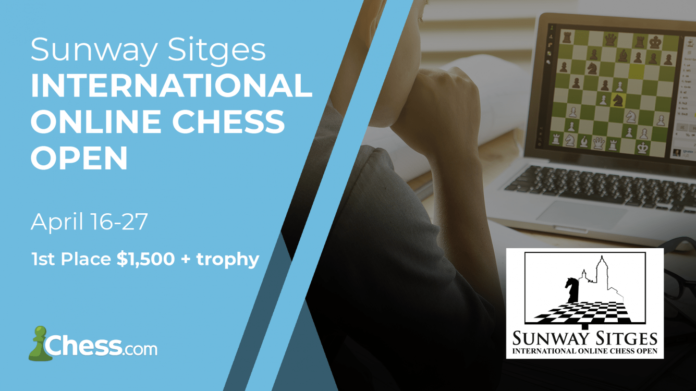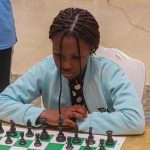The inaugural Sunway Sitges International Online Chess Open tournament, likely the first-ever classical open tournament played online, will start Friday, April 17 on Chess.com.
You can register now and support the local Sitges hospital in their fight against COVID-19.
There’s the regular open tournament in Sitges, Spain, which is still scheduled for December 2020. In the meantime, organizer Oskar Stober Blazquez came up with another event: the Sunway Sitges International Online Chess Open tournament—a full-fledged open tournament, which is not FIDE rated and is played online.
The format is a 9-round Swiss, followed by a 16-player knockout. The time control for the Swiss portion is 90 minutes per player for the game, with an increment of 30 seconds per move. The first prize is €1,500.
The rounds will be played April 17-25 each day at 17:30 CEST which is 11:30 a.m. Eastern and 08:30 a.m. Pacific time.
There will be two groups. The open section (group A) will be open to all players with a valid FIDE ID. Group B will be open to players with a FIDE rating below 2000 and who have not surpassed 2100 in the last three years. Playing in this group is optional: all players can enroll in group A if they wish.
Prizes A group

Prizes B group

You can register by filling out the form below. Registration for the tournament shall be valid once the registration form has been filled in and payment by a valid credit/debit card has been confirmed. The registration fee is 15 euros or $16,50. All benefits will go to a local hospital fighting COVID-19 (Hospital Residència Sant Camil) after the deduction of tournament costs. Players in either category who have an existing Chess.com diamond membership may gift their prize to a friend or family member.
Below is some more information:
Byes
The number of byes a player can request is unlimited. For each bye or rest requested, zero points will be assigned. Byes should be requested by sending an e-mail to referees before the end of the round before the one they are requesting the bye.
Tie-breaks
After the 9th round, a provisional classification for both groups will be obtained by applying the following tie-break system, and in the following order:
1) Buchholz FIDE minus the worse result.
2) Total Buchholz FIDE.
3) Sonnenborn-Berger.
4) Mutual score
5) Raffle in the virtual presence of the Competition Committee.
According to that provisional classification, the knockout portion will be organized on April 26 in order to decide the final finishing places as well as for distribution of trophies and/or cash prizes. There will be no ties for places, and the knockout will decide the final placement.
The top 16 finishers in the swiss portion of each group will have to play match-play knockout games that will decide the final general classification. This match-play knockout system (round of 16, quarter-finals, semifinal and final) among the top 16 players of each section of the tournament, will take place in the following way:
a) 2 blitz games with a time control of 5 minutes + 3 seconds per play (5 ‘+ 3 “), alternating colors.
b) In case of a tie, a blitz game “Armaggedon”, with 6 minutes for the player with white and 5 minutes for the player with black, who has draw odds.
Fair play regulations and measures
All players must have a webcam and the ability to enable audio on their playing devices. Moreover, players must have an active Skype account in order to communicate with referees or to be contacted by them.
Only the player playing in each game may be present in the playing area, and no other people can be present that room or playing area while the game is being played. It is also strictly forbidden to have any other electronic devices than the one used to play in the playing room or playing area.
All games will be checked by Chess.com’s Fair Play Team and by the tournament arbiters. Furthermore, arbiters will be entitled to use video surveillance of players. Games under video surveillance can be decided both prior to the start of each round, randomly during each round or even by the request of a player. The arbiters reserve the right to decide in each case.
Source: chess.com















